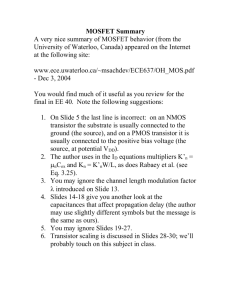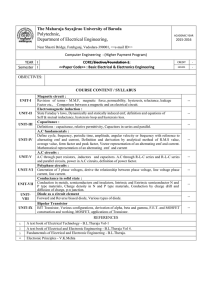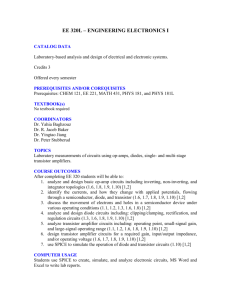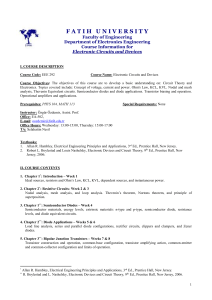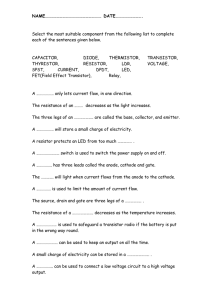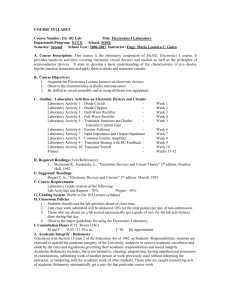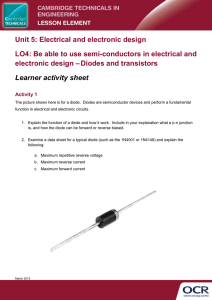Course Out Line - 3rd Semester Notes
advertisement
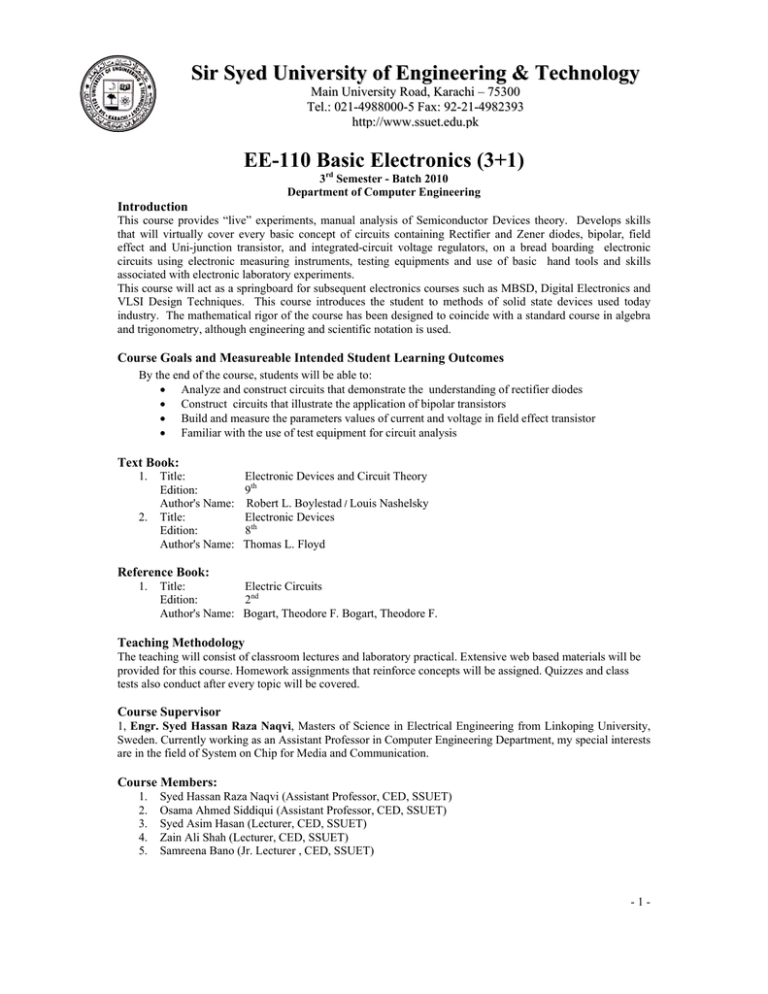
Sir Syed University of Engineering & Technology Main University Road, Karachi – 75300 Tel.: 021-4988000-5 Fax: 92-21-4982393 http://www.ssuet.edu.pk EE-110 Basic Electronics (3+1) 3rd Semester - Batch 2010 Department of Computer Engineering Introduction This course provides “live” experiments, manual analysis of Semiconductor Devices theory. Develops skills that will virtually cover every basic concept of circuits containing Rectifier and Zener diodes, bipolar, field effect and Uni-junction transistor, and integrated-circuit voltage regulators, on a bread boarding electronic circuits using electronic measuring instruments, testing equipments and use of basic hand tools and skills associated with electronic laboratory experiments. This course will act as a springboard for subsequent electronics courses such as MBSD, Digital Electronics and VLSI Design Techniques. This course introduces the student to methods of solid state devices used today industry. The mathematical rigor of the course has been designed to coincide with a standard course in algebra and trigonometry, although engineering and scientific notation is used. Course Goals and Measureable Intended Student Learning Outcomes By the end of the course, students will be able to: • Analyze and construct circuits that demonstrate the understanding of rectifier diodes • Construct circuits that illustrate the application of bipolar transistors • Build and measure the parameters values of current and voltage in field effect transistor • Familiar with the use of test equipment for circuit analysis Text Book: 1. 2. Title: Edition: Author's Name: Title: Edition: Author's Name: Electronic Devices and Circuit Theory 9th Robert L. Boylestad / Louis Nashelsky Electronic Devices 8th Thomas L. Floyd Reference Book: 1. Title: Electric Circuits Edition: 2nd Author's Name: Bogart, Theodore F. Bogart, Theodore F. Teaching Methodology The teaching will consist of classroom lectures and laboratory practical. Extensive web based materials will be provided for this course. Homework assignments that reinforce concepts will be assigned. Quizzes and class tests also conduct after every topic will be covered. Course Supervisor 1, Engr. Syed Hassan Raza Naqvi, Masters of Science in Electrical Engineering from Linkoping University, Sweden. Currently working as an Assistant Professor in Computer Engineering Department, my special interests are in the field of System on Chip for Media and Communication. Course Members: 1. 2. 3. 4. 5. Syed Hassan Raza Naqvi (Assistant Professor, CED, SSUET) Osama Ahmed Siddiqui (Assistant Professor, CED, SSUET) Syed Asim Hasan (Lecturer, CED, SSUET) Zain Ali Shah (Lecturer, CED, SSUET) Samreena Bano (Jr. Lecturer , CED, SSUET) -1- Course Outline WEEK DATE TOPIC Week 1 27th Jan. 2011 BCAM Review LECTURE Lecture 1 Lecture 2 Lecture 3 Lecture 4 Week 2 31st Jan. 2011 Basic Electronics Introduction Lecture 5 Lecture 6 Lecture 7 Week 3 7th Feb. 2011 Week 4 14th Feb. 2011 Week 5 21st Feb. 2011 Week 6 28th Feb. 2011 Week 7 7th Mar. 2011 Week 8 14th Mar. 2011 Week 9 21st Mar. 2011 Week 10 Lecture 8 Diode Diode Applications Lecture 10 Load line analysis and diode approximations Series-Parallel configuration Half wave Rectification Full wave Rectification Clipper circuits Clamper circuits Introduction to LEDs, Introduction to Zener diode. Zener diode applications. Transistor construction NPN Transistor operation PNP Transistor operation Revision Lecture 17 Lecture 18 Lecture 19 Lecture 20 Lecture 21 Spring Semester Mid Term Examination 2011 Lecture 22 Transistor configuration Lecture 23 Transistor configuration (cont.) Bipolar Junction Transistors (Cont.) Lecture 24 Lecture 25 28th Mar. 2011 BJT DC Analysis Week 11 4th April 2011 Lecture 26 Lecture 27 Lecture 28 Lecture 29 Lecture 30 Week 12 11th April 2011 Intrinsic semiconductors, Extrinsic semiconductors, Doping N doping, P doping, Properties of both P and N type materials P-N junction, Depletion Layer, Thershold Voltage Lecture 11 Lecture 12 Lecture 13 Lecture 14 Lecture 15 STATUS Superposition Theorem, Examples of Series and Parallel circuits Basic structure of atoms, Properties of Materials Properties of insulators, Conductors, and Semiconductors, Covalent bonding Band theory, Transport in Semiconductors, Lecture 9 Lecture 16 Bipolar Junction Transistors TOPIC CONTENTS Introduction, Thevenin Theorem Examples of Thevenin Theorem, Norton Equivalent Circuit Field Effect Transistors Lecture 31 Transistor data sheet and terminal identification Operation regions, fixed bias configuration Fixed bias configuration (cont. ) Emitter Bias configuration Voltage divider bias configuration DC bias with voltage feedback configuration Miscellaneous bias configuration Junction Field Effect Transistors -2- Lecture 32 Week 13 Week 14 Lecture 33 Lecture 34 Lecture 35 18th April 2011 Lecture 36 Lecture 37 25th April 2011 FET Biasing 2nd May 2011 Week 15 9th May 2011 Week 16 Week 17 Week 18 Lecture 38 Lecture 39 Lecture 40 Lecture 41 Revision 16th May 2011 23rd May 2011 Lecture 42 Lecture 43 Lecture 44 Lecture 45 Construction and Characteristics of JFET Depletion Type MOSFET Enhancement Type MOSFET Baisc Operation of MOSFET Complementary Metal Oxide Semiconductor Introduction, Fixed Bias Configuration Self Bias configuration Voltage Divider Biasing Depletion Type MOSFET Biasing Enhancement Type MOSFET Biasing Summary Table Revision Preparation Leaves Spring Semester Final Examination 2011 Lab work and Project Lab work will be described by the course supervisor in the weekly lab and you will be given the lab assignments which should be checked by the course supervisor / assistant on the spot and marked after the completion. The lab work, assignment and final viva will account for 10% of the grade. After the midterm you will be given a semester project, which will account at least 10% of the sectional awards. Lab Outline WEEK Week 1 DATE 31st Jan. 2011 LAB Lab 0 Week 2 7th Feb. 2011 Lab 1 Week 3 14th Feb. 2011 Lab 2 Week 4 21st Feb. 2011 Lab 3 Week 5 28th Feb. 2011 Lab 4 Week 6 7th Mar. 2011 Lab 5 Week 7 14th Mar. 2011 Lab 6 Week 8 21st Mar. 2011 Week 9 28th Mar. 2011 Lab 7 Week 10 4th April 2011 Lab 8 TOPIC CONTENTS Introduction to Basic Electronics To verify superposition principle in DC Circuit s. STATUS To study the characteristics of silicon diodes. To calculate and draw the DC output voltages of half-wave rectifiers. To calculate and draw the DC output voltages of full-wave rectifiers. To calculate and measure the output voltages of clipper circuits. To calculate and measure the output voltages of clamper circuits. Spring Semester Mid Term Examination 2011 To study the characteristics of Zener diode.To study the voltage regulation in Zener diode regulation circuit. Characterization of an NPN Bipolar Junction Transistor (BJT) -3- Week 11 11th April 2011 2 Lab 9 To graph thhe collector chharacteristics off a transistor. To measure AC C & DC voltagges in a common emitter amplifieer. Week 12 18th April 2011 2 Lab 100 To determiine the quiesceent operating conditions of the fixed annd voltage diviider bias BJT configgurations. Week 13 25th April 2011 2 Lab 111 To study thhe Basic Transsistor Applicatiions. Week 14 2nd May 20 011 Lab 122 Week 15 Week 16 Week 17 Week 18 9th May 2011 16th May 20011 23rd May 2011 30th May 20011 Lab 133 Lab 144 To establissh the output annd transfer characterisstics for a JFET T transistor. Final Projeect and Lab Viv va Final Projeect and Lab Viv va Preparatio on Leaves Springg Semester Finaal Examinationn 2011 Attendan nce Attendancee is required ass per university y policy and wiill account of the t sectional m marks. Mid Term m and Final Exam E The Mid Term T exam will w be held inn 8th week of this semester and will accoount of 15% of the grade. A comprehennsive Final Exaam will be held d which will acccount for 60% % of the grade. Class and d Home Assiggnments The homew work assignmeents will be con nceptually diffiicult. Note the strategy of thee work: you neeed to start on thhe homeworkk assignment sooon after they are a assigned to you. These hoome works willl account for 5% 5 of the gradee. 9 Late work w will not be b accepted in any a circumstannce -4-
